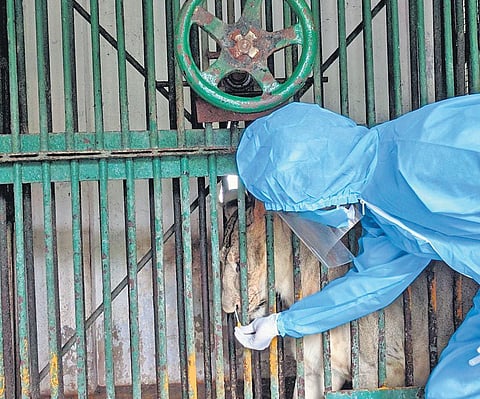

CHENNAI: Clearly, all is not well in Arignar Anna Zoological Park (AAZP). It has earned the dubious distinction of losing two young Asiatic lions to Covid-19 within the last 15 days. A male lion Pathbanathan in the prime age of 12 years succumbed to the disease on Wednesday morning with no comorbidities, while the Covid-infected older lions that were critical are showing signs of recovery.
The samples of Pathbanathan were tested positive for SARS-CoV-2 along with deceased lioness Neela and seven others by National Institute of High Security Animal Diseases (NIHSAD), Bhopal on June 3.
Naga Sathish Gidijala, Deputy Director of Vandalur Zoo, told The New Indian Express that Pathbanathan was healthy and showed no symptoms, except for occasional cough, until 4-5 days back. "We are currently in a state of grief. He started rejecting food about five days back and his health started deteriorating rapidly, despite our veterinarians trying all possible ways to recuperate his health in consultation with experts from TANUVAS."
Pathbanathan was offered chicken soup, mutton soup, rabbit, mutton and beef. However, he refused to take any food. The lion developed breathing difficulties on Tuesday, which is when zoo authorities brought an oxygen cylinder. "With great difficulty, we have put him on oxygen support and was breathing normally. But, sadly the lion breathed last on 10.15 am Wednesday," Sathish said.
Following the protocol, the carcass was incinerated before collecting a few tissue and blood samples for further analysis.
Meanwhile, the two lionesses Kavitha (23) and Bhuvana (19), who have also tested positive for Covid-19 and were reacting to treatment slowly, have begun showing signs of recovery. Authorities said the two lionesses started to have food, which is an encouraging sign. "They are definitely holding on. But considering their old age, we are still keeping our fingers crossed," an official said and added that, in the wild, the average age of lions is 15-16 years and in captivity they can survive upto 24 years.
ALSO READ: COVID-19: Asiatic lioness succumbs, two critical as Chennai's Vandalur Zoo reports India's first confirmed animal death
Samples collected for genome sequencing:
Officials told The New Indian Express that Pathbanathan samples were collected and will be sent to Centre for Cellular and Molecular Biology (CCMB) in Hyderabad to conduct genome sequencing of the virus strain.
Initially, apprehension was expressed by the Vandalur Zoo to send the samples to CCMB as earlier samples of lioness Neela and four other lions were reported leaked and contaminated. Instead, the zoo was planning to send the samples to National Institute of High Security Animal Diseases (NIHSAD) in Bhopal, which is also an accredited lab for conducting genome sequencing. However, sources said Central Zoo Authority (CZA) has intervened and directed the Vandalur Zoo to send the samples to CCMB, which is considered as best-in-class.
Vandalur Zoo officials claimed that they were still not sure how the previous samples sent to CCMB leaked. "We followed the standard guidelines of sample collection and packaging. We sent three sets of samples to Indian Veterinary Research Institute (IVRI) in Bareilly and NIHSAD in Bhopal following the same procedure. They were tested and gave the results. How do the samples sent to CCMB alone get contaminated? We were not communicated properly either. Five samples were sent of which CCMB tested one faecal sample and rejected four samples," an official said.
Florida Tilton, chairman and managing director of Chennai-based Biozone Research Technologies Pvt Ltd, told The New Indian Express that genome sequencing is the most important thing during a pandemic such as this.
"The genome sequencing will give us a deep understanding of the virus strain that infected the lions. We will know whether it is similar to coronavirus strain infecting humans, how different is it from virus strains that infected big cats in other zoos across the country, whether it is mutating, its behavior in terms of how fast it spreads, the kind of symptoms and the intensity of the disease it causes. All this information is crucial for future diagnosis and treatment protocol. It can be known only through genome sequencing," Florida said.